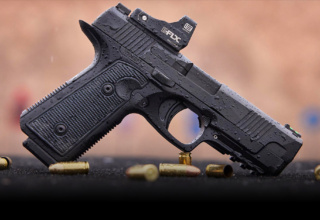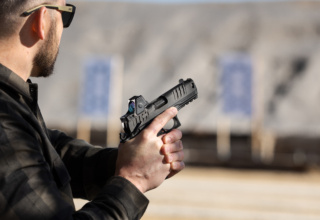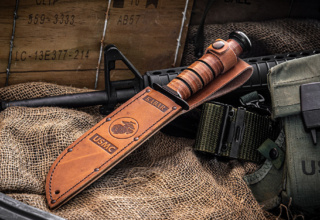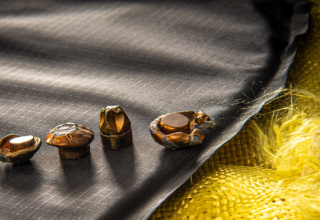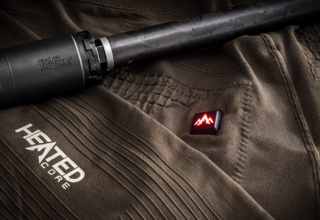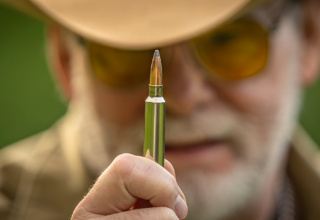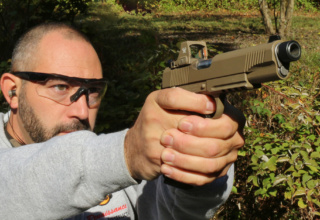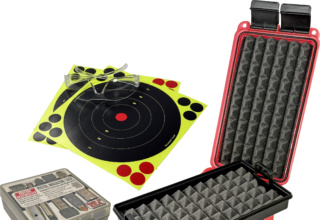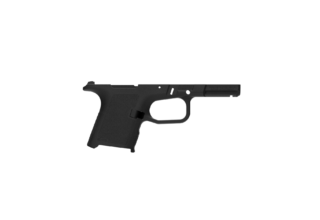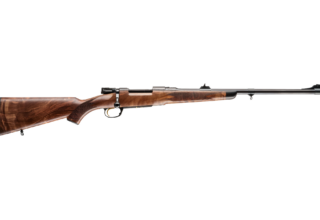There is no questioning the popularity of the compact Taurus G2c for those who favor 9mm carry pistols. Since its introduction (first as the Millennium G2 and then the G2c), this little polymer powerhouse has received plenty of praise for its reliability, ergonomics, overall performance and, almost as important, its remarkably low price point.
Not everyone, though, has been satisfied—at least not in the way you might think.
The Taurus G2 series pistols proved it possible to create a high-quality, reliable-performing defensive pistol not only in a compact package but also at a price nearly half that of other handguns in its class. Fans of the full-size 9mm pistols came to appreciate the design and engineering behind the G2, but understandably said, “Hey, what about us?”
Well, Taurus has answered that question with the release of the new G3 9mm—the next-generation in the G-series line.
We got our hands on one of the first production model G3s and have had a couple weeks to get to know it prior to the official release date. Since we have been shooting a G2c for the last four years, we were quite excited to see how this new full-size model would compare to its compact predecessor.
Frame Facts
At first blush, the G3 looks simply like a bigger version of the G2c. The polymer frame, although larger, follows the same general profile. The grip is one of the frame’s key features, in our opinion. It has a modest palm swell along the backstrap that positions your strong hand high and tight for good wrist alignment. Assisting in muzzle control and weapon retention are generous and sticky stippling patches all around the grip. It feels like the same texture as that of the G2c, only there is more of it. No matter how you like to hold the pistol, your hand is going to stick in place.

Each side of the frame includes molded-in Memory Pads. These are simply depressions with a slight shelf along the bottom that align with the thumbs of most shooters when taking a proper grip. Their purpose is to help deliver a repeatable grip, which is ideal for proper form and accuracy. Both sides of the frame include these Memory Pads to accommodate left- or right-hand shooters.
The mag release button is optimally positioned just below the left-side Memory Pad. We found it easy to depress without losing our grip position, making tactical mag changes a breeze. Up front, the G3 frame includes an integrated Picatinny rail sized right for adding a light or light/laser combo. Viridian has already developed their E-Series laser sight for the G3 that mounts along the trigger guard. Since the G3 trigger guard is dimensionally similar to the G2c, the E-Series laser also fits the G2c, G2s, G2, and PT111 pistols.
Speaking of the trigger, it’s shaped a bit differently than that of the G2c. It’s slightly beefier in dimension, and the trigger safety covers less of the shoe and is somewhat wider. Trigger pull is a comfortable six pounds. One difference we noted is that the G3 trigger breaks a little earlier than that of the G2c. Having compared the two, we actually prefer the G3’s shorter travel before the break. The trigger reset is also pleasingly short, although a tad longer than the G2c. Overall, it’s ideally tuned for a full-size platform.
The Topside
The slide presented Taurus engineers with some design flexibility, although the general profile exhibits obvious G2c DNA. The G3 now includes front serrations (in addition to the rear serrations), which required eliminating the familiar slide scoops between the end of the slide and the ejection port. The trapezoidal shape of the slide continues, along with generous front and rear beveling to promote ease of holstering and to minimize clothing snags when carrying concealed.

Taurus is offering the G3 in two slide options—matte black or matte stainless. The matte black version is treated win an oxi-nitrocarburizing process that is intended to be a stronger, more wear-resistant case-hardened surface.
Topping the slide are white dot front and rear sights. The rear sight is a new design for the G-series. Unlike the plastic and fully adjustable G2c rear sight, the G3 rear sight is all steel. While not adjustable for elevation, it can be drifted for windage adjustment by loosening the set screw and nudging it left or right as needed.
Beneath the slide is a four-inch stainless steel barrel, broach-cut for better rifling consistency and exacting tolerances. The big surprise is the guide rod and recoil spring assembly. Here we find a definite upgrade from the G2c. Whereas the G2c uses a plastic guide rod, the G3 has been fitted with a steel rod system—a superior design choice in our book.
On the Range
Handgun fit is quite personal, as most serious shooters will attest, and firearm manufacturers work hard to develop pistols that are functionally ergonomic for that broadest range of shooters. As a shooter with medium-size hands, I can pretty well adapt to most platforms. The G3 is one of those full-size guns that requires little adapting on the part of the shooter.
At 25 ounces (unloaded), the G3 feels relatively light and well balanced. It doesn’t have that awkward, bulky feel of some full-size pistols. Much of the credit for that goes to the grip design, which puts your hand high on the frame and with your index finger at a comfortable angle for a straight trigger pull.
Charging the pistol from the slide-locked-open position proved easy enough. The angle of the slide release and the crisp serrations on the lever made manipulation easy. Ditto for pulling the slide rearward. The slide serrations provide a good grip and the recoil spring isn’t so stout that it should be problematic even for small-frame shooters.

The sight picture of the G3 is good. The rear sight is rather wide across the blade compared to some full-size pistols, so your eye tends to easily and quickly align with the front sight. The rear notch is a square-cut design. It aligns well enough with the front sight, but for our taste, we would prefer a U-notch with a slightly wider cut. We measured the sight radius at 6-7/8 inches—an ample stretch for a defensive handgun.
Recoil was about what you would expect from a 9mm polymer-frame pistol. Not too harsh, not too soft, and there were no interruptions in the cycle of operation. Muzzle flip was marginal and quick to recover for follow-up shots.
For accuracy testing, we went through a few types of ammo, shooting round-nose and Hornady XTP bullets in 124-grain hand loads plus several 115-grain factory loads of assorted manufacturers. The G3 seemed to favor the heavier bullets. Our best 5-shot, 10-yard group measured 1.631 inches.

Final Thoughts
Although long-term testing may reveal some peculiarities with the G3, our initial impression gives the pistol high marks across the board. Performance seems on par with similar-sized polymer-frame 9mm pistols costing considerably more than the G3.
Regarding price, the G3’s MSRP is $345.23 for the matte black slide models and $360.70 for the matte stainless slide version. Given that the current G2c MSRPs run in the low-$300s, that’s a lot of gun and performance for the price.
Considering the track record of the previous G-series pistols, we’ll lay good money on the bet that Taurus has delivered another home run with the G3.

DON’T FORGET TO ENTER THE GIVEAWAY HERE!
Taurus G3 Specifications
Caliber: 9mm Luger
Capacity: 10, 15, or 17 (with extended magazine)
Finish: Matte Black / Matte Stainless
Grip/Frame: Polymer
Firing System: Single Action with Restrike Capability
Action Type: Striker
Safety: Manual and Trigger Safety, Striker Block
Sights Front: Fixed (White Dot)
Sights Rear: Drift Adjustable (White Dots)
Slide Material: Carbon Steel, Stainless Steel
Slide Finish: Matte Black / Matte Stainless
Overall Length: 7.30″
Overall Width: 1.25″
Overall Height: 5.20″
Barrel Length: 4.00″
Weight: 25 oz. (unloaded)
Magazines Included: 2×10, 2×15, or 1×15 and 1×17
Packaging Size: 12.5″ x 6″ x 1.75″
Packaging Weight: 2.75 lbs.
Additional Feature: Picatinny Rail (MIL-STD 1913)


